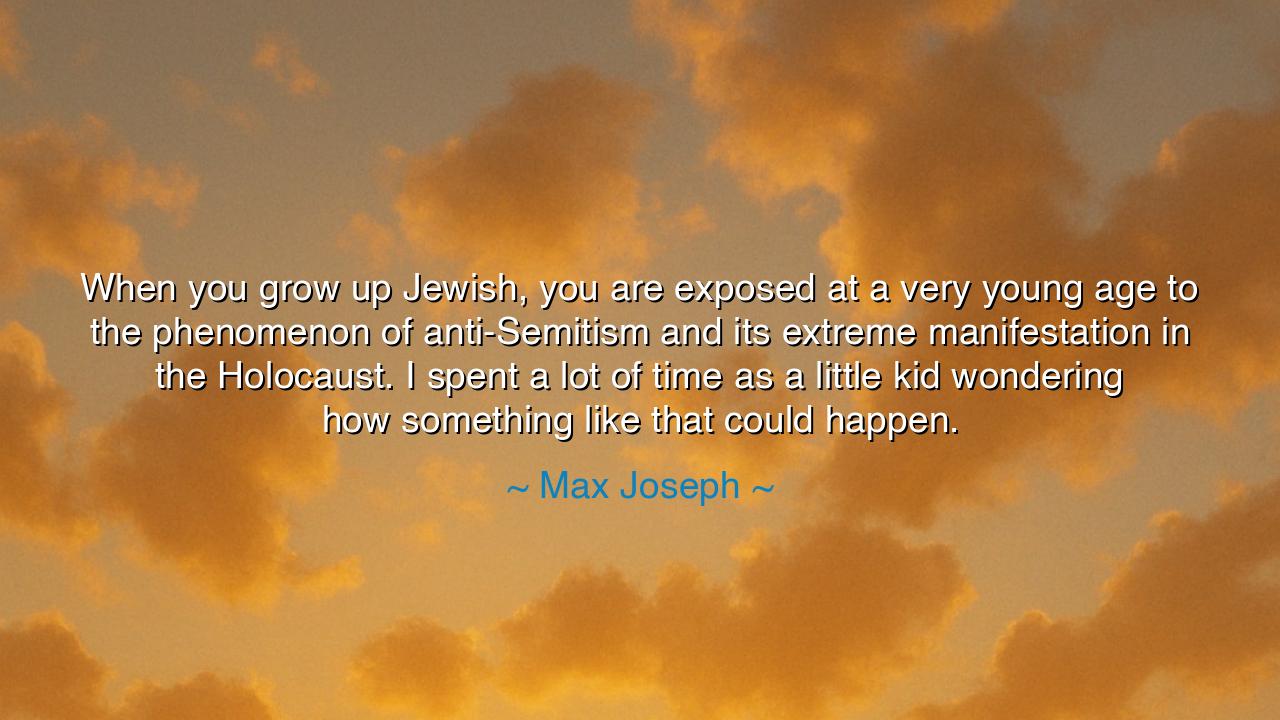
When you grow up Jewish, you are exposed at a very young age to
When you grow up Jewish, you are exposed at a very young age to the phenomenon of anti-Semitism and its extreme manifestation in the Holocaust. I spent a lot of time as a little kid wondering how something like that could happen.






“When you grow up Jewish, you are exposed at a very young age to the phenomenon of anti-Semitism and its extreme manifestation in the Holocaust. I spent a lot of time as a little kid wondering how something like that could happen.” — Max Joseph
Thus spoke Max Joseph, filmmaker and storyteller, reflecting upon the burden of memory that is laid upon those born into a people whose very survival is an act of defiance. In these words lies a truth both ancient and sorrowful — that to grow up Jewish is to awaken early to the shadow that history has cast upon one’s name. Childhood, which for most is a realm of innocence, becomes for some a classroom of tragedy. For from their earliest days, Jewish children inherit not only their faith and traditions, but also the haunting question of how hatred could rise so high as to consume millions of lives.
Anti-Semitism, that dark and ancient venom, is not merely a chapter in history; it is a wound that reopens in every generation. Max Joseph’s reflection is not about fear alone, but about awakening — the moment when a young mind, still tender and pure, first learns that evil can be deliberate, organized, and justified by those who call themselves civilized. He speaks of wondering, not in curiosity but in anguish — the bewilderment of a soul too young to understand how human hearts could turn cold enough to destroy. That early exposure becomes a silent tutor, shaping both compassion and vigilance in the generations that follow.
The Holocaust, that abyss of the twentieth century, stands as the most horrific manifestation of this ancient hatred. Six million lives extinguished, not by chaos but by system — by law, by ideology, by the machinery of the state. To the child who learns of it, there is no comprehension, only trembling awe. And yet, within that confrontation with horror, something else is born: the moral inheritance of memory. Every Jewish child grows up knowing that to forget is to endanger the living. Thus, remembrance becomes both shield and flame — a way of saying to the past, You will not vanish from our hearts, even if you tried to vanish us from the earth.
Consider the tale of Elie Wiesel, who as a boy walked through the gates of Auschwitz and emerged as a witness for all humanity. His later writings were not cries of vengeance but of understanding — to teach the world how such evil arises, and how it must never be allowed to rise again. Wiesel, like Max Joseph, spent his youth asking how, but he turned that question into a lifelong mission: to ensure that future generations would never have to ask it anew. Their journeys remind us that knowledge of suffering, when borne with courage, becomes wisdom; and that even the ashes of despair can nourish the seeds of hope.
What Max Joseph reveals, therefore, is not only the burden of being born into a people haunted by history, but the honor of inheriting its lessons. To be Jewish — or to grow up conscious of any ancestral suffering — is to carry the twin fires of memory and resilience. It is to live in a world that has tried to destroy you, and yet still believe in art, in laughter, in goodness. It is to gaze into the darkness of humanity and still choose to create light. In this sense, the exposure he speaks of is not only to hatred, but also to the strength that survives it.
The ancients would have called this the education of the soul — to see the full range of what humanity is capable of, both monstrous and divine, and to respond not with hatred, but with vigilance and love. The child who learns of such evil learns also the sacred responsibility of justice, the calling to prevent its return. Thus, from pain arises purpose; from sorrow, a deepened humanity. And that, perhaps, is the hidden gift within the wound: to have seen the worst and to have chosen still to believe in the best.
Practical counsel for the living:
-
Teach the young not only what happened, but why — so they may recognize injustice before it blooms.
-
Do not allow the horrors of history to become mere words in books; let them be lessons written upon the conscience.
-
Stand against hatred wherever it hides, for silence is the soil in which cruelty grows.
-
And remember, always, that remembrance itself is a form of resistance — to remember is to keep the light alive.
For as Max Joseph reminds us, to grow up aware of the world’s cruelty is painful, but it is also awakening. The wise do not let such awareness harden them into cynicism, but refine them into compassion. The question “How could it happen?” must never fade — not because the answer is simple, but because the asking keeps us human.






AAdministratorAdministrator
Welcome, honored guests. Please leave a comment, we will respond soon